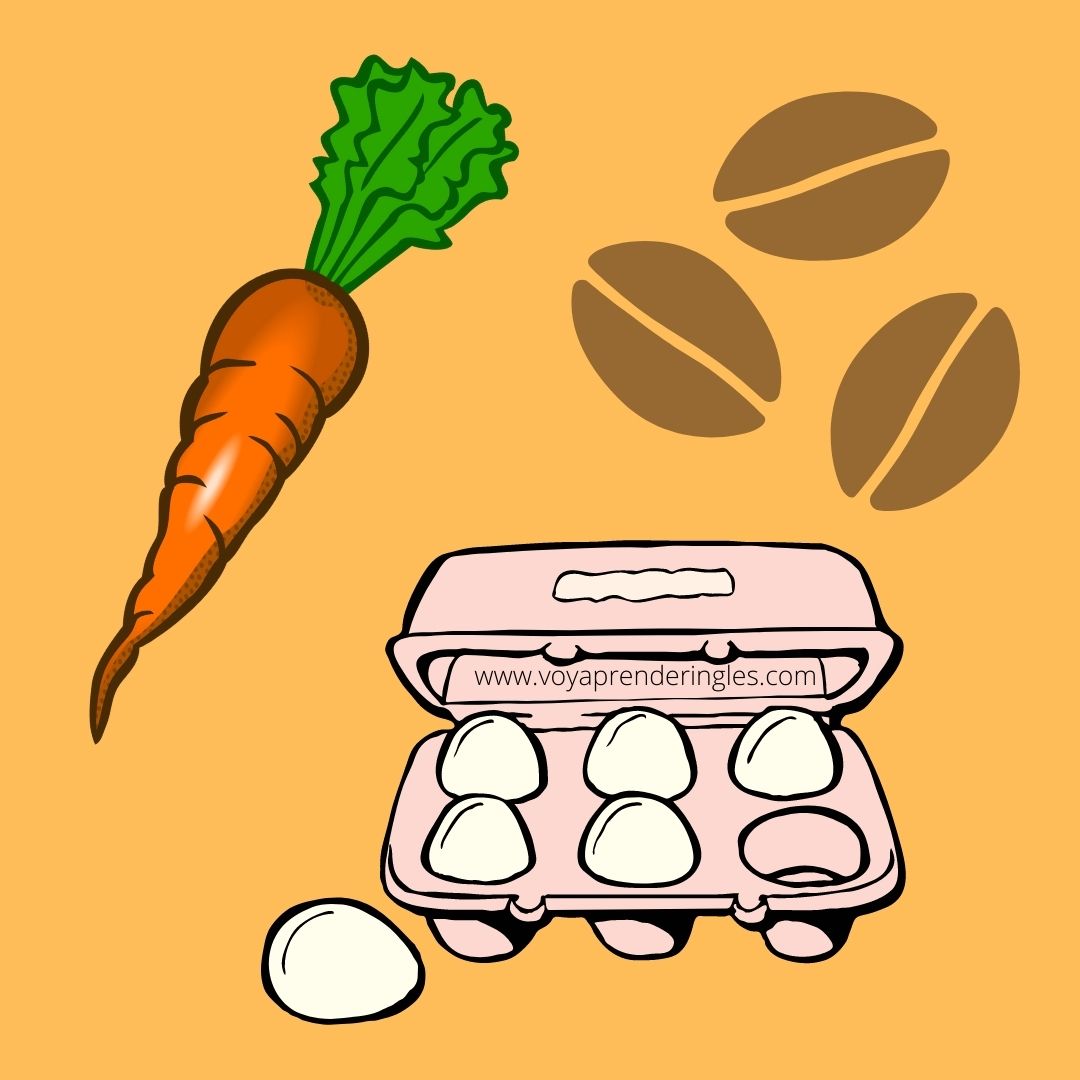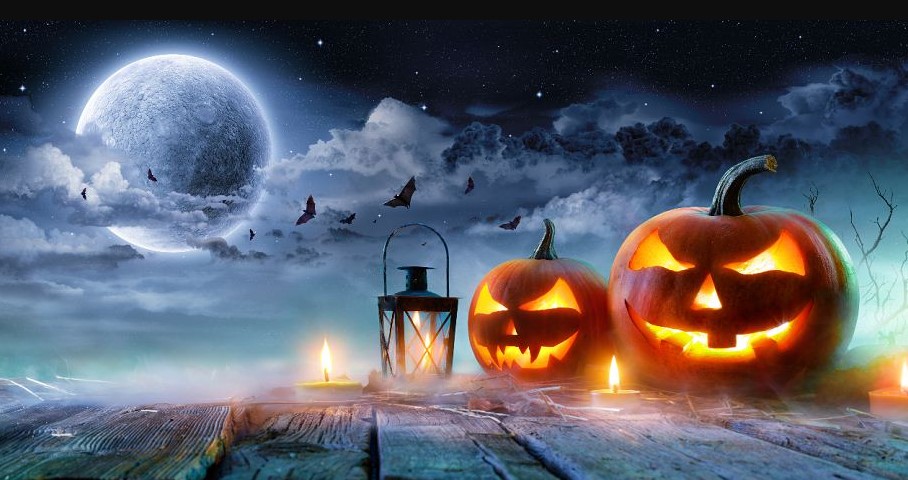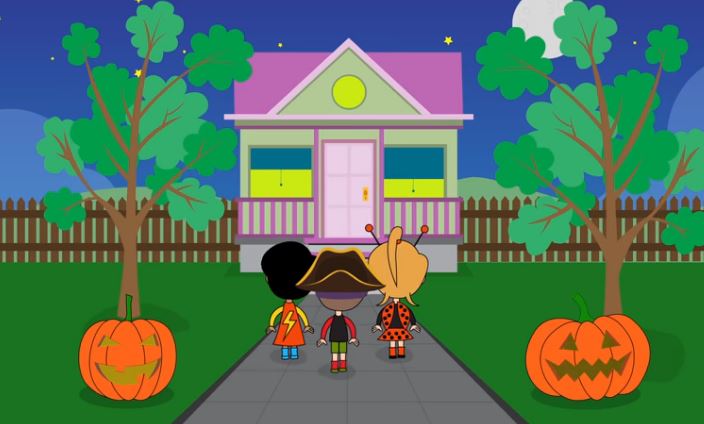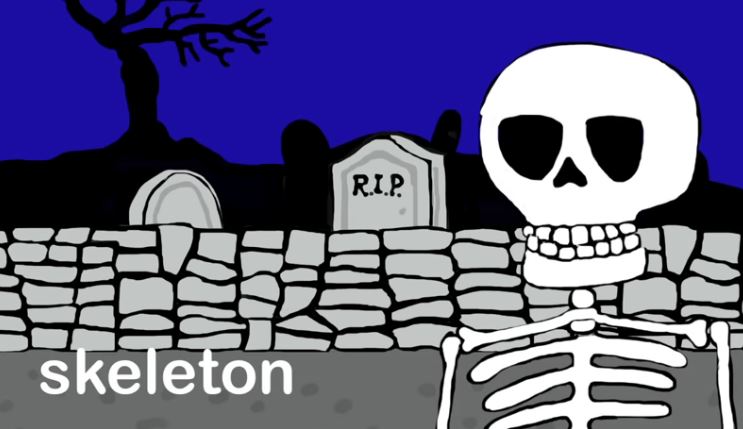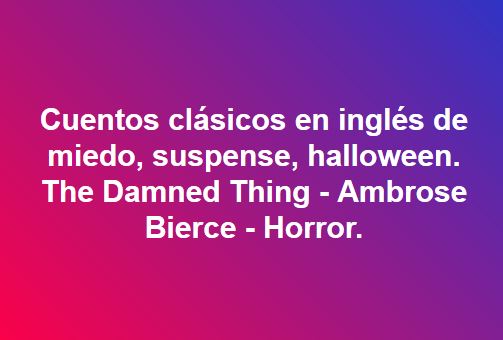
Recursos Educativos en Inglés - Stories in English
Cuentos clásicos en inglés de miedo, suspense, halloween
The Damned Thing - Ambrose Bierce - Horror
I: One Does Not Always Eat What is on the Table
By the light of a tallow candle which had been placed on one end of a rough table a man was reading something written in a book. It was an old account book, greatly worn; and the writing was not, apparently, very legible, for the man sometimes held the page close to the flame of the candle to get a stronger light on it. The shadow of the book would then throw into obscurity a half of the room, darkening a number of faces and figures; for besides the reader, eight other men were present. Seven of them sat against the rough log walls, silent, motionless, and the room being small, not very far from the table. By extending an arm anyone of them could have touched the eighth man, who lay on the table, face upward, partly covered by a sheet, his arms at his sides. He was dead.
The man with the book was not reading aloud, and no one spoke; all seemed to be waiting for something to occur; the dead man only was without expectation. From the blank darkness outside came in, through the aperture that served for a window, all the ever unfamiliar noises of night in the wilderness -- the long nameless note of a distant coyote; the stilly pulsing thrill of tireless insects in trees; strange cries of night birds, so different from those of the birds of day; the drone of great blundering beetles, and all that mysterious chorus of small sounds that seem always to have been but half heard when they have suddenly ceased, as if conscious of an indiscretion. But nothing of all this was noted in that company; its members were not overmuch addicted to idle interest in matters of no practical importance; that was obvious in every line of their rugged faces -- obvious even in the dim light of the single candle. They were evidently men of the vicinity -- farmers and woodsmen.
The person reading was a trifle different; one would have said of him that he was of the world, worldly, albeit there was that in his attire which attested a certain fellowship with the organisms of his environment. His coat would hardly have passed muster in San Francisco; his foot-gear was not of urban origin, and the hat that lay by him on the floor (he was the only one uncovered) was such that if one had considered it as an article of mere personal adornment he would have missed its meaning. In countenance the man was rather prepossessing, with just a hint of sternness; though that he may have assumed or cultivated, as appropriate to one in authority. For he was a coroner. It was by virtue of his office that he had possession of the book in which he was reading; it had been found among the dead man's effects -- in his cabin, where the inquest was now taking place.
When the coroner had finished reading he put the book into his breast pocket. At that moment the door was pushed open and a young man entered. He, clearly, was not of mountain birth and breeding: he was clad as those who dwell in cities. His clothing was dusty, however, as from travel. He had, in fact, been riding hard to attend the inquest.
The coroner nodded; no one else greeted him.
'We have waited for you,' said the coroner. 'It is necessary to have done with this business to-night.'
The young man smiled. 'I am sorry to have kept you,' he said. 'I went away, not to evade your summons, but to post to my newspaper an account of what I suppose I am called back to relate.'
The coroner smiled.
'The account that you posted to your newspaper,' he said, 'differs, probably, from that which you will give here under oath.'
'That,' replied the other, rather hotly and with a visible flush, 'is as you please. I used manifold paper and have a copy of what I sent. It was not written as news, for it is incredible, but as fiction. It may go as a part of my testimony under oath.'
'But you say it is incredible.'
'That is nothing to you, sir, if I also swear that it is true.'
The coroner was silent for a time, his eyes upon the floor. The men about the sides of the cabin talked in whispers, but seldom withdrew their gaze from the face of the corpse. Presently the coroner lifted his eyes and said: 'We will resume the inquest.'
The men removed their hats. The witness was sworn.
'What is your name? ' the coroner asked.
'William Harker.'
'Age? '
'Twenty-seven.'
'You knew the deceased, Hugh Morgan?'
'Yes.'
'You were with him when he died?'
'Near him.'
'How did that happen -- your presence, I mean ? '
'I was visiting him at this place to shoot and fish. A part of my purpose, however, was to study him and his odd, solitary way of life. He seemed a good model for a character in fiction. I sometimes write stories.'
'I sometimes read them.'
'Thank you.'
'Stories in general -- not yours.'
Some of the jurors laughed. Against a sombre background humour shows high lights. Soldiers in the intervals of battle laugh easily, and a jest in the death chamber conquers by surprise.
'Relate the circumstances of this man's death,' said the coroner. 'You may use any notes or memoranda that you please.'
The witness understood. Pulling a manuscript from his breast pocket he held it near the candle and turning the leaves until he found the passage that he wanted began to read.
II: What may Happen in a Field of Wild Oats
'. . . The sun had hardly risen when we left the house. We were looking for quail, each with a shotgun, but we had only one dog. Morgan said that our best ground was beyond a certain ridge that he pointed out, and we crossed it by a trail through the chaparral. On the other side was comparatively level ground, thickly covered with wild oats. As we emerged from the chaparral Morgan was but a few yards in advance. Suddenly we heard, at a little distance to our right and partly in front, a noise as of some animal thrashing about in the bushes, which we could see were violently agitated.
"We've started a deer," I said. "I wish we had brought a rifle."
'Morgan, who had stopped and was intently watching the agitated chaparral, said nothing, but had cocked both barrels of his gun and was holding it in readiness to aim. I thought him a trifle excited, which surprised me, for be had a reputation for exceptional coolness, even in moments of sudden and imminent peril.
'"Oh, come," I said. "You are not going to fill up a deer with quail-shot, are you?"
'Still he did not reply; but catching a sight of his face as he turned it slightly toward me I was struck by the intensity of his look. Then I understood that we had serious business in hand, and my first conjecture was that we had "jumped" a grizzly. I advanced to Morgan's side, cocking my piece as I moved.
'The bushes were now quiet and the sounds had ceased, but Morgan was as attentive to the place as before.
'"What is it? What the devil is it?" I asked.
'"That Damned Thing!" he replied, without turning his head. His voice was husky and unnatural. He trembled visibly.
'I was about to speak further, when I observed the wild oats near the place of the disturbance moving in the most inexplicable way. I can hardly describe it. It seemed as if stirred by a streak of wind, which not only bent it, but pressed it down-crushed it so that it did not rise; and this movement was slowly prolonging itself directly toward us.
'Nothing that I had ever seen had affected me so strangely as this unfamiliar and unaccountable phenomenon, yet I am unable to recall any sense of fear. I remember -- and tell it here because, singularly enough, I recollected it then -- that once in looking carelessly out of an open window I momentarily mistook a small tree close at hand for one of a group of larger trees at a little distance away. It looked the same size as the others, but being more distinctly and sharply defined in mass and detail seemed out of harmony with them. It was a mere falsification of the law of aerial perspective, but it startled, almost terrified me. We so rely upon the orderly operation of familiar natural laws that any seeming suspension of them is noted as a menace to our safety, a warning of unthinkable calamity. So now the apparently causeless movement of the herbage and the slow, undeviating approach of the line of disturbance were distinctly disquieting. My companion appeared actually frightened, and I could hardly credit my senses when I saw him suddenly throw his gun to his shoulder and fire both barrels at the agitated grain! Before the smoke of the discharge had cleared away I heard a loud savage cry -- a scream like that of a wild animal -- and flinging his gun upon the ground Morgan sprang away and ran swiftly from the spot. At the same instant I was thrown violently to the ground by the impact of something unseen in the smoke -- some soft, heavy substance that seemed thrown against me with great force.
'Before I could get upon my feet and recover my gun, which seemed to have been struck from my hands, I heard Morgan crying out as if in mortal agony, and mingling with his cries were such hoarse, savage sounds as one hears from fighting dogs. Inexpressibly terrified, I struggled to my feet and looked in the direction of Morgan's retreat; and may Heaven in mercy spare me from another sight like that! At a distance of less than thirty yards was my friend, down upon one knee, his head thrown back at a frightful angle, hatless, his long hair in disorder and his whole body in violent movement from side to side, backward and forward. His right arm was lifted and seemed to lack the hand -- at least, I could see none. The other arm was invisible. At times, as my memory now reports this extraordinary scene, I could discern but a part of his body; it was as if he had been partly blotted out -- I cannot otherwise express it -- then a shifting of his position would bring it all into view again.
'All this must have occurred within a few seconds, yet in that time Morgan assumed all the postures of a determined wrestler vanquished by superior weight and strength. I saw nothing but him, and him not always distinctly. During the entire incident his shouts and curses were heard, as if through an enveloping uproar of such sounds of rage and fury as I had never heard from the throat of man or brute!
'For a moment only I stood irresolute, then throwing down my gun I ran forward to my friend's assistance. I had a vague belief that he was suffering from a fit, or some form of convulsion. Before I could reach his side he was down and quiet. All sounds had ceased, but with a feeling of such terror as even these awful events had not inspired I now saw again the mysterious movement of the wild oats, prolonging itself from the trampled area about the prostrate man toward the edge of a wood. It was only when it had reached the wood that I was able to withdraw my eyes and look at my companion. He was dead.'
III: A Man though Naked may be in Rags
The coroner rose from his seat and stood beside the dead man. Lifting an edge of the sheet he pulled it away, exposing the entire body, altogether naked and showing in the candle-light a clay-like yellow. It had, however, broad maculations of bluish black, obviously caused by extravasated blood from contusions. The chest and sides looked as if they had been beaten with a bludgeon. There were dreadful lacerations; the skin was torn in strips and shreds.
The coroner moved round to the end of the table and undid a silk handkerchief which had been passed under the chin and knotted on the top of the head. When the handkerchief was drawn away it exposed what had been the throat. Some of the jurors who had risen to get a better view repented their curiosity and turned away their faces. Witness Harker went to the open window and leaned out across the sill, faint and sick. Dropping the handkerchief upon the dead man's neck the coroner stepped to an angle of the room and from a pile of clothing produced one garment after another, each of which he held up a moment for inspection. All were torn, and stiff with blood. The jurors did not make a closer inspection. They seemed rather uninterested. They had, in truth, seen all this before; the only thing that was new to them being Harker's testimony.
'Gentlemen,' the coroner said, 'we have no more evidence, I think. Your duty has been already explained to you; if there is nothing you wish to ask you may go outside and consider your verdict.'
The foreman rose -- a tall, bearded man of sixty, coarsely clad.
'I should like to ask one question, Mr. Coroner,' he said. 'What asylum did this yer last witness escape from?'
'Mr. Harker,' said the coroner gravely and tranquilly, 'from what asylum did you last escape? ' Harker flushed crimson again, but said nothing, and the seven jurors rose and solemnly filed out of the cabin.
'If you have done insulting me, sir,' said Harker, as soon as he and the officer were left alone with the dead man, 'I suppose I am at liberty to go?'
'Yes.'
Harker started to leave, but paused, with his hand on the door latch. The habit of his profession was strong in him -- stronger than his sense of personal dignity. He turned about and said:
'The book that you have there -- I recognize it as Morgan's diary. You seemed greatly interested in it; you read in it while I was testifying. May I see it? The public would like -- '
'The book will cut no figure in this matter,' replied the official, slipping it into his coat pocket; 'all the entries in it were made before the writer's death.'
As Harker passed out of the house the jury reentered and stood about the table, on which the now covered corpse showed under the sheet with sharp definition. The foreman seated himself near the candle, produced from his breast pocket a pencil and scrap of paper and wrote rather laboriously the following verdict, which with various degrees of effort all signed:
'We, the jury, do find that the remains come to their death at the hands of a mountain lion, but some of us thinks, all the same, they had fits.'
IV: An Explanation from the Tomb
In the diary of the late Hugh Morgan are certain interesting entries having, possibly, a scientific value as suggestions. At the inquest upon his body the book was not put in evidence; possibly the coroner thought it not worth while to confuse the jury. The date of the first of the entries mentioned cannot be ascertained; the upper part of the leaf is torn away; the part of the entry remaining follows:
'. . . would run in a half-circle, keeping his head turned always toward the centre, and again he would stand still, barking furiously. At last he ran away into the brush as fast as he could go. I thought at first that he had gone mad, but on returning to the house found no other alteration in his manner than what was obviously due to fear of punishment.
'Can a dog see with his nose? Do odours impress some cerebral centre with images of the thing that emitted them? . . .
'Sept. 2. -- Looking at the stars last night as they rose above the crest of the ridge east of the house, I observed them successively disappear -- from left to right. Each was eclipsed but an instant, and only a few at the same time, but along the entire length of the ridge all that were within a degree or two of the crest were blotted out. It was as if something had passed along between me and them; but I could not see it, and the stars were not thick enough to define its outline. Ugh! don't like this.' . . .
Several weeks' entries are missing, three leaves being torn from the book.
'Sept. 27. -- It has been about here again -- I find evidences of its presence every day. I watched again all last night in the same cover, gun in hand, double-charged with buckshot. In the morning the fresh footprints were there, as before. Yet I would have sworn that I did not sleep -- indeed, I hardly sleep at all. It is terrible, insupportable! If these amazing experiences are real I shall go mad; if they are fanciful I am mad already.
'Oct. 3. -- I shall not go -- it shall not drive me away. No, this is my house, my land. God hates a coward....
'Oct. 5. -- I can stand it no longer; I have invited Harker to pass a few weeks with me -- he has a level head. I can judge from his manner if he thinks me mad.
'Oct. 7. -- I have the solution of the mystery; it came to me last night -- suddenly, as by revelation. How simple -- how terribly simple!
'There are sounds that we cannot hear. At either end of the scale are notes that stir no chord of that imperfect instrument, the human ear. They are too high or too grave. I have observed a flock of blackbirds occupying an entire tree-top -- the tops of several trees -- and all in full song. Suddenly -- in a moment -- at absolutely the same instant -- all spring into the air and fly away. How? They could not all see one another -- whole tree-tops intervened. At no point could a leader have been visible to all. There must have been a signal of warning or command, high and shrill above the din, but by me unheard. I have observed, too, the same simultaneous flight when all were silent, among not only blackbirds, but other birds -- quail, for example, widely separated by bushes -- even on opposite sides of a hill.
'It is known to seamen that a school of whales basking or sporting on the surface of the ocean, miles apart, with the convexity of the earth between, will sometimes dive at the same instant -- all gone out of sight in a moment. The signal has been sounded -- too grave for the ear of the sailor at the masthead and his comrades on the deck -- who nevertheless feel its vibrations in the ship as the stones of a cathedral are stirred by the bass of the organ.
'As with sounds, so with colours. At each end of the solar spectrum the chemist can detect the presence of what are known as "actinic" rays. They represent colours -- integral colours in the composition of light -- which we are unable to discern. The human eye is an imperfect instrument; its range is but a few octaves of the real "chromatic scale." I am not mad; there are colours that we cannot see.
'And, God help me! the Damned Thing is of such a colour!'
🔆 Otros cuentos:
Adblock test (Why?)


